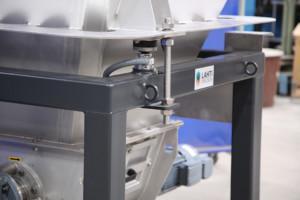Are you planning to get a big bag station? Before you go any further in the buying process, we recommend that you consider a few factors.
Bulk bagging is used for a wide variety of products such as construction products, fertilizers, flour, pellets and metal processing products. Many of these bagging applications serve as a trading aid in the case of commercial scales.
When planning a new big bag filling station, the most important thing is to first thoroughly find out all the starting information. In this case, the type of big bag and the mechanical structure of the filling station with its feeding devices can be designed according to the customer’s needs. The material to be bagged and its features must be known exactly before choosing, for example, what kind of dosing devices are used to fill the bags.
Our design emphasizes long-term experience with the behavior of various dry powdered substances at different stages of the process. Over the years, we have delivered more than 200 factory projects dealing with dozens of different powdered dry materials. We are also able to utilize this experience in the dosing and weighing of individual substances. In many cases, dosing and weighing go hand in hand and by taking a notice the characteristics of the materials to be considered in the design, it is possible to build a reliable and accurate process and an efficient overall investment.

Details to consider when acquiring a big bag station:
Features of the material to be bagged
The big bagging device can be used to bag a wide range of materials, from light to very heavy. For example, a fluidizable material behaves differently from other materials and this allows for hardware solutions that differ from traditional solutions. The fluid equipment we supply enables the transfer of bulk material by gravity like a liquid. Because there are no engines, significantly less energy is consumed and the efficiency of the production process increases. In addition, due to the tightness of the equipment, dusting is reduced, which improves working conditions.
The size and the purpose of the big bag
The purpose of the big bag must be known in advance. Is it an outdoor breaking sack, is there a separate inner bag inside the sack? What kind of valve is inside the bag? What about the filling sock? Even such small factors have a significant effect on the technical solutions of the big bagging device.
Scale accuracy and data transfer
Bagging always involves essentially weighing the product and managing the weighing information. In the case of a big bag with a specific weight (eg 1000 kg), the customer only pays by that weight. However, if a non-specific weight big bag is used (weighing result e.g. 996 kg), the buyer adds up the weights of the weighing slips and pays for this weighed quantity. It is also important to discuss how the weighing data is managed and how connections to ERP and other systems are handled. The type of dosing device and the coarse and fine dosing functions of the dosing control determine the dosing accuracy of the specific bag.
Utilizing the digital mScales weighing service, it is possible to intensify many different functions such as the purchasing process, invoicing and material flow management. The amount of manual work is significantly reduced and at the same time the number of errors is minimized.
Commercial or non-commercial scales
The scale is in commercial use when the weighing result is used to determine the price of a product or service. In addition to the weighing result, the identification data of the weighing is also transferred to the subscriber’s system. This same information is also stored in the log memory of the dosing controller. The structure and operation of the scale must meet certain criteria, which are determined by laws, directives and many other standards. In addition, the design and implementation of scale-related automation is not as straightforward as in the case of a non-commercial scale. In other words, the design of a commercial scale requires expertise in a very different way from the basic process scale in order to comply with the legal requirements.
Our bagging stations are always in accordance with the EU type-examination certificate and the Machinery Directive, as well as CE-marked. You will receive a turnkey package from us, including the design, manufacturing, installation and commissioning of the equipment.
The CareLAHTI service ensures cost-effective service and maintenance during the life cycle of the weighing system. By connecting the scales to the mScales weighing service, we also enable remote diagnostics. In addition to periodic inspection of the scale, we can also perform initial verification of the scales and maintenance sealing. In addition, we take care of the maintenance and modernization of old scales. Lahti Precision’s rights to carry out various inspections based on metrological standards are broader than any other scale maintenance company in Finland.
The author of the article is Jari Haraholma, Sales Manager of Dosing and Weighing Systems
Want to know more? Contact us
Jari Haraholma
Sales Manager, Dosing and weighing systems
+358 400 431 550
jari.haraholma@lahtiprecision.com
We design and manufacture big bag scales and filling stations for commercial or non-commercial use tailored to your needs.
Check out our reliable products
Is my scale in commercial use?
The structure and operation of the commercial scale must meet certain criteria, which are determined by laws, directives and many other standards.